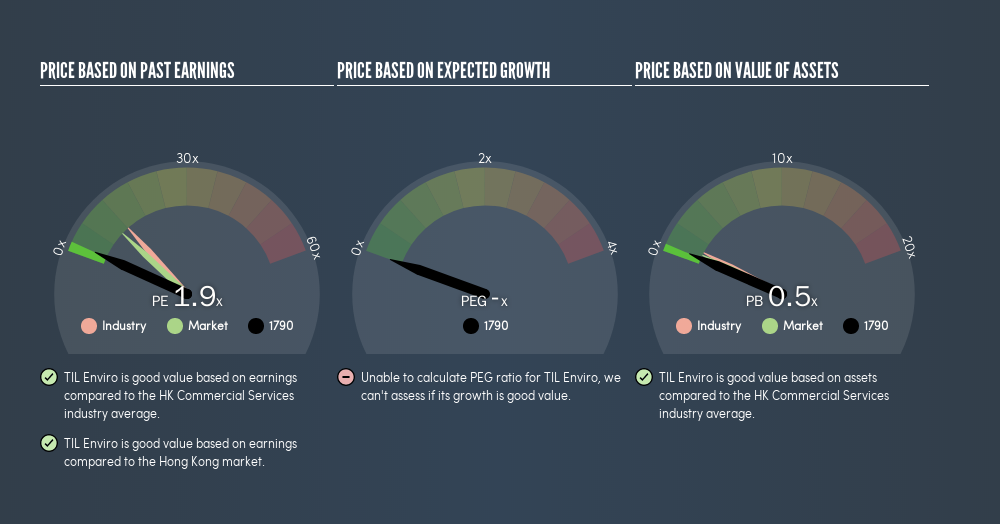
Today, we'll introduce the concept of the P/E ratio for those who are learning about investing. We'll show how you can use TIL Enviro Limited's (HKG:1790) P/E ratio to inform your assessment of the investment opportunity. TIL Enviro has a price to earnings ratio of 1.9, based on the last twelve months. That corresponds to an earnings yield of approximately 53%.
See our latest analysis for TIL Enviro
How Do I Calculate A Price To Earnings Ratio?
The formula for price to earnings is:
Price to Earnings Ratio = Share Price ÷ Earnings per Share (EPS)
Or for TIL Enviro:
P/E of 1.9 = HK$0.48 ÷ HK$0.26 (Based on the year to December 2018.)
Is A High Price-to-Earnings Ratio Good?
A higher P/E ratio means that investors are paying a higher price for each HK$1 of company earnings. All else being equal, it's better to pay a low price -- but as Warren Buffett said, 'It's far better to buy a wonderful company at a fair price than a fair company at a wonderful price.'
Does TIL Enviro Have A Relatively High Or Low P/E For Its Industry?
The P/E ratio indicates whether the market has higher or lower expectations of a company. If you look at the image below, you can see TIL Enviro has a lower P/E than the average (12.1) in the commercial services industry classification.

Its relatively low P/E ratio indicates that TIL Enviro shareholders think it will struggle to do as well as other companies in its industry classification.
How Growth Rates Impact P/E Ratios
P/E ratios primarily reflect market expectations around earnings growth rates. When earnings grow, the 'E' increases, over time. That means even if the current P/E is high, it will reduce over time if the share price stays flat. And as that P/E ratio drops, the company will look cheap, unless its share price increases.
TIL Enviro's earnings per share fell by 67% in the last twelve months.
A Limitation: P/E Ratios Ignore Debt and Cash In The Bank
The 'Price' in P/E reflects the market capitalization of the company. So it won't reflect the advantage of cash, or disadvantage of debt. Theoretically, a business can improve its earnings (and produce a lower P/E in the future) by investing in growth. That means taking on debt (or spending its cash).
Such expenditure might be good or bad, in the long term, but the point here is that the balance sheet is not reflected by this ratio.
So What Does TIL Enviro's Balance Sheet Tell Us?
Net debt totals 96% of TIL Enviro's market cap. This is enough debt that you'd have to make some adjustments before using the P/E ratio to compare it to a company with net cash.
The Verdict On TIL Enviro's P/E Ratio
TIL Enviro's P/E is 1.9 which is below average (9.9) in the HK market. The P/E reflects market pessimism that probably arises from the lack of recent EPS growth, paired with significant leverage.
Investors should be looking to buy stocks that the market is wrong about. As value investor Benjamin Graham famously said, 'In the short run, the market is a voting machine but in the long run, it is a weighing machine.' We don't have analyst forecasts, but you could get a better understanding of its growth by checking out this more detailed historical graph of earnings, revenue and cash flow.
You might be able to find a better buy than TIL Enviro. If you want a selection of possible winners, check out this free list of interesting companies that trade on a P/E below 20 (but have proven they can grow earnings).
We aim to bring you long-term focused research analysis driven by fundamental data. Note that our analysis may not factor in the latest price-sensitive company announcements or qualitative material.
If you spot an error that warrants correction, please contact the editor at editorial-team@simplywallst.com. This article by Simply Wall St is general in nature. It does not constitute a recommendation to buy or sell any stock, and does not take account of your objectives, or your financial situation. Simply Wall St has no position in the stocks mentioned. Thank you for reading.
About SEHK:1790
TIL Enviro
Provides wastewater treatment in the People’s Republic of China.
Flawless balance sheet and good value.
Market Insights
Community Narratives





